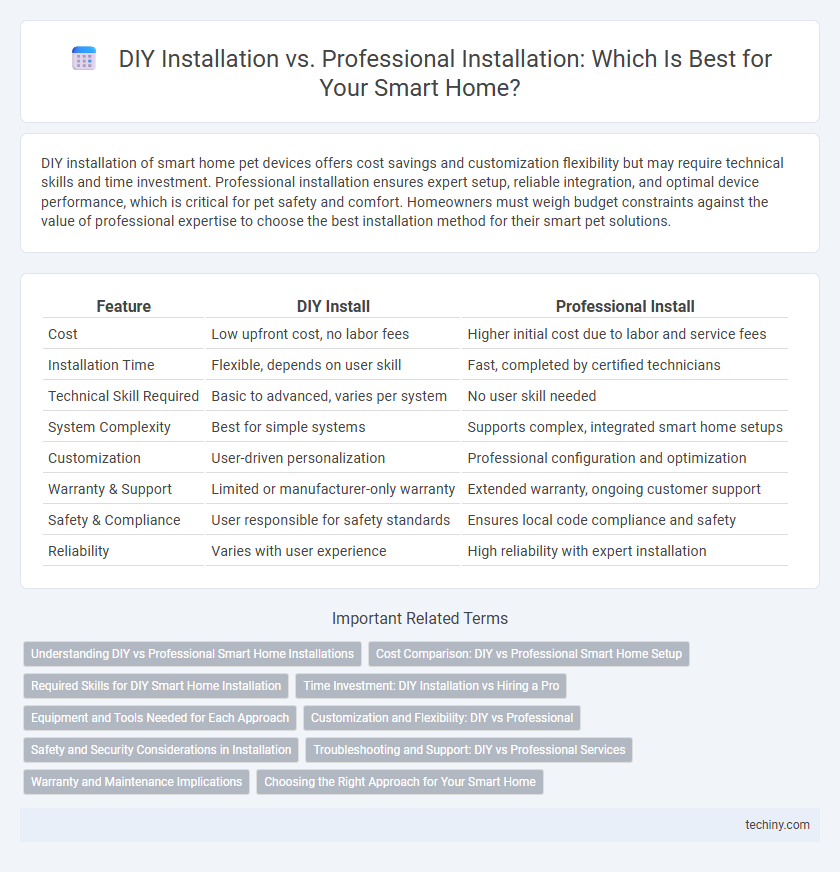DIY installation of smart home pet devices offers cost savings and customization flexibility but may require technical skills and time investment. Professional installation ensures expert setup, reliable integration, and optimal device performance, which is critical for pet safety and comfort. Homeowners must weigh budget constraints against the value of professional expertise to choose the best installation method for their smart pet solutions.
Table of Comparison
| Feature | DIY Install | Professional Install |
|---|---|---|
| Cost | Low upfront cost, no labor fees | Higher initial cost due to labor and service fees |
| Installation Time | Flexible, depends on user skill | Fast, completed by certified technicians |
| Technical Skill Required | Basic to advanced, varies per system | No user skill needed |
| System Complexity | Best for simple systems | Supports complex, integrated smart home setups |
| Customization | User-driven personalization | Professional configuration and optimization |
| Warranty & Support | Limited or manufacturer-only warranty | Extended warranty, ongoing customer support |
| Safety & Compliance | User responsible for safety standards | Ensures local code compliance and safety |
| Reliability | Varies with user experience | High reliability with expert installation |
Understanding DIY vs Professional Smart Home Installations
DIY smart home installations offer cost savings and customization but require technical knowledge and time investment for optimal setup and troubleshooting. Professional installations provide expert system integration, warranty, and support ensuring reliable, seamless operation, especially for complex or larger systems. Assessing the scale and technical complexity of the smart home setup helps determine whether DIY or professional services deliver the best long-term value and performance.
Cost Comparison: DIY vs Professional Smart Home Setup
DIY smart home installation significantly reduces upfront costs by eliminating labor fees, with typical expenses ranging from $100 to $500 for essential devices and tools. Professional installation costs average between $500 and $2,500, depending on system complexity and home size, often including warranty and technical support. Homeowners seeking budget-friendly options favor DIY for basic setups, while those prioritizing system integration and reliability invest in professional services.
Required Skills for DIY Smart Home Installation
DIY smart home installation demands a solid understanding of basic electrical work, wireless networking, and compatibility among devices to ensure seamless integration. Homeowners need proficiency in configuring routers, troubleshooting connectivity issues, and following detailed setup instructions to avoid common pitfalls. Mastery of DIY install skills reduces dependency on professional services, lowering costs while enhancing customization flexibility.
Time Investment: DIY Installation vs Hiring a Pro
DIY installation of smart home systems typically requires significant time investment, as users must research, set up, and troubleshoot devices independently. Professional installation significantly reduces setup time, with trained technicians completing complex configurations efficiently, often within a few hours. Choosing professional services ensures faster integration and minimizes system errors, especially for advanced smart home setups.
Equipment and Tools Needed for Each Approach
DIY smart home installations typically require basic hand tools such as screwdrivers, wire strippers, and voltage testers, along with the smart devices themselves, making the process affordable and accessible for tech-savvy homeowners. Professional installations involve advanced diagnostic tools and specialized equipment to ensure proper integration with existing systems and compliance with safety standards, often resulting in a more seamless and reliable setup. Choosing between DIY and professional installation impacts the required investment in tools, technical expertise, and long-term system performance.
Customization and Flexibility: DIY vs Professional
DIY smart home installs offer greater customization and flexibility, allowing users to tailor devices and settings to their specific preferences without paying for labor. Professional installations provide expert configuration and seamless integration, ensuring optimal performance and compatibility with complex systems. Choosing between DIY and professional options depends on individual technical skills and desired customization level.
Safety and Security Considerations in Installation
DIY installation of smart home systems requires careful adherence to manufacturer guidelines to ensure all devices function securely and avoid vulnerabilities. Professional installation offers expert knowledge in integrating security protocols, reducing risks of improper setup that could expose the network to cyberattacks or physical tampering. Prioritizing safety features such as encrypted connections, correct device placement, and compliance with local electrical codes is critical to maintaining a secure smart home environment.
Troubleshooting and Support: DIY vs Professional Services
DIY smart home installations often require users to independently troubleshoot connectivity issues, device compatibility, and software updates, which can be time-consuming and technically challenging. Professional install services provide expert troubleshooting, immediate support, and warranty coverage that ensure seamless integration and rapid resolution of problems. Access to professional technical assistance reduces downtime and enhances system reliability compared to the DIY approach.
Warranty and Maintenance Implications
DIY smart home installations often void manufacturer warranties and place maintenance responsibilities entirely on the homeowner, increasing the risk of costly repairs. Professional installations typically include warranty coverage and ongoing maintenance support, ensuring system reliability and manufacturer compliance. Choosing professional installation reduces potential liability and preserves warranty validity, providing peace of mind for long-term smart home performance.
Choosing the Right Approach for Your Smart Home
Choosing the right approach for your smart home installation depends on your technical skills, budget, and desired customization level. DIY installation offers cost savings and flexibility for tech-savvy users, while professional installation ensures expert setup, system integration, and ongoing support for complex systems. Evaluating product compatibility, security concerns, and time availability helps determine whether a do-it-yourself or professional approach best suits your smart home needs.
DIY install vs Professional install Infographic

 techiny.com
techiny.com